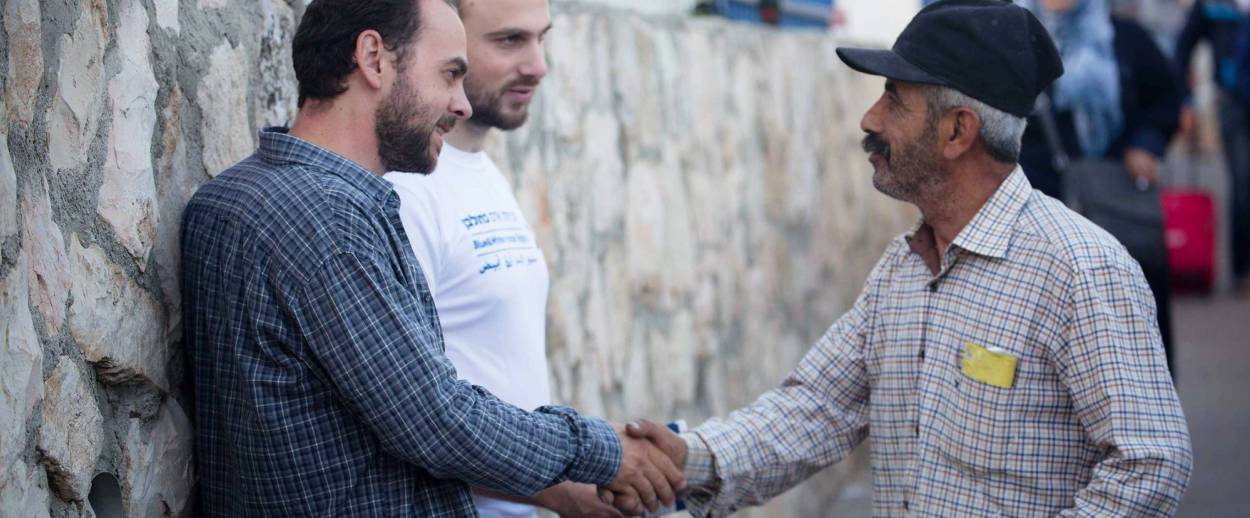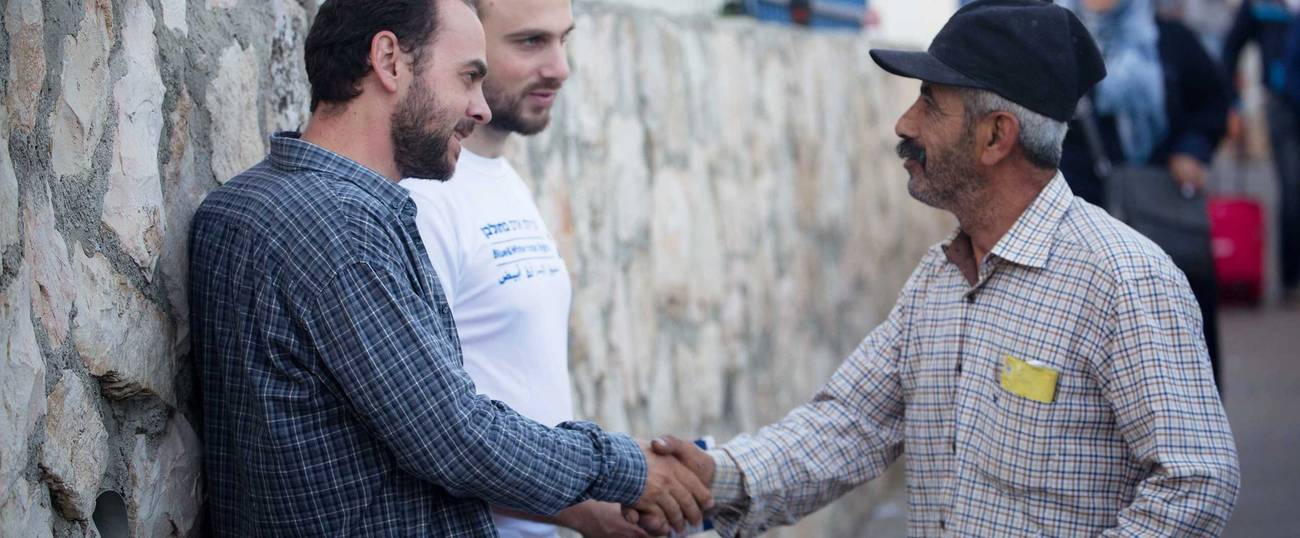It’s 6 a.m. and I’m at the Qalandiya checkpoint in northern Jerusalem, one of the crossings where Palestinians come from the Palestinian Authority into Israel. The place is massive. On one side, traffic files through. On the other, a steady stream of men click through a turnstile, rebuckling their pant belts, TSA-style.
I’m here to observe the work of Blue and White Human Rights, an initiative of the Institute for Zionist Strategies, a right-leaning think tank and policy shop based out of Jerusalem. Apart from a few women who come through the gate and head straight to waiting buses, I am the only woman here. I hadn’t planned to broadcast my “Americanness” but in a baseball cap, knee-length jeans skirt and Chuck Taylors, I realize that is the likely effect.
I meet up with Nicolas Nisim Touboul, a project coordinator at Blue and White, and his two volunteers who are at this checkpoint three mornings a week. They are here to observe the flow through the crossing and to hear any grievances the Palestinians may have while handing out flyers offering assistance to the people who pass by.
“About 3,000 people use this crossing every morning between 5 and 7 a.m.,” Touboul, born in 1991 in France, tells me. “Men coming for work make up about 95 percent, the other 5 percent are women and others who come for education or medical reasons. Generally, the men crossing have work visas, and once through the security check (metal detectors) they are free to go beyond the crossing. When there are no issues, crossing can take 15 minutes but if there are, it can take an hour. We are here to try and make the process as smooth as possible.”
To do this, Touboul and his team talk to Palestinians, ask how long they waited, and if there are any problems they need help with.
Blue and White has a pool of 20 volunteers and fellows that work at 3 IDF-managed crossings: Qalandiya, Rachel, and Zeitim, which they visit three times a week.
While the volunteers have no authority over soldiers who staff the checkpoint, they report their findings to IDF commanders. “Most complaints are about behavior of soldiers,” Touboul says. “Not issues of mistreatment, but things like they are on the phone and too slow. They are 18-year-olds,” he says.
“We can’t make any change on the Palestinian side and they don’t make it easy for them to get to the crossings. They don’t improve roads or provide parking. On the other side of the checkpoint [in the PA], the dirt lot that serves as a parking area for those seeking to cross is run by a gang that charges a “security fee” to protect the vehicles.”
How does Blue and White know what happens on the other side? They employ people like Nassar, a 55-year-old Christian Arab, who is Blue and White’s eyes and ears in the Palestinian territories. Every morning, Nassar sends Touboul pictures and videos from the other side of the checkpoints and now, after I spoke with Nassar, he sends me them too.
Nassar was working in Jerusalem when a group of Israeli-Arabs stole materials from the work site and beat him in the process. Not knowing how to press charges, he called Blue and White, having gotten their information from the flyers they hand out. They helped him go to the authorities, and he’s been helping them ever since. The inquiries that come to Blue and White are varied. Many deal with work visas that have been taken away. “Sometimes they’re taken for legitimate reasons and sometimes it’s not. We help them look into it, find out the reason and help them get it back if it turns out it was a mistake.”
When asked if other human rights organizations do the same, another volunteer, Yedidya from Efrat (a West Bank settlement) shakes his head. “They aren’t often here. They come and go. They show up, and if nothing bad is happening that they can film they leave.”
Nave Dromi, 33, served in the IDF, was a Hillel emissary on behalf of the Jewish Agency at the University of Pennsylvania. She holds a B.A. in Middle East and politics and a M.A. in American Jewry studies. She joined the Institute for Zionist Strategies as a volunteer and has run Blue and White for the past four years. “We do not offer political solutions. We are solely working on assisting Palestinians without any geopolitical position. There are organizations that have operated near to 30 years and have accomplished no change on the ground in their entire existence. They spend their time trying to pressure Israel with human rights as a tool. I don’t see how they support the human rights of any Palestinian that wants to live and work like everyone else.”
Her programs help Palestinians reach medical attention. “If someone’s child is sick and they want her to be treated in Hadassah Hospital, we ask them for ID, a description of the health problem, what they have done so far, etc. Often, these are cases that the health services in their area can’t handle and they may not know how to get an appointment in the hospital.”
“We check the details with COGAT (Coordinator of Government Activities in the Territories, a branch in Israel’s Ministry of Defense) and they assist us in getting it done. Sometimes someone needs care, but the only available escort has been involved in terror activities, so we approach the family and help them find another escort.”
Consider the case of the 52 Israeli and Palestinian Arabs who were tortured by the Yasser Arafat-controlled Palestinian Authority in the years between the mid-1990s and early 2000s. In an unprecedented move, the plaintiffs in the case filed a 2017 lawsuit in Israeli courts against the PA. In order to determine damages, the judge asked for medical evidence of their pain and suffering. Their lawyer, Barak Kedem, approached a number of human rights organizations for help. “These are people who are suffering from a number of parallel disabilities–physical disability, psychiatric, urological, and others. Some are suffering from five or more disabilities and are therefore in need of experts to determine their overall disability profile.” On Israeli radio and in statements posted on Facebook, Kedem said that his call went unanswered or was directly declined by major human rights organizations such as B’Tselem, MachsomWatch and Doctors Without Borders.
“We offered to help, even though we are a small program,” said Dromi. “Unbelievably, some of the doctors I approached myself said no, they wouldn’t help to paint the PA in a bad light.”
Ali (not his real name), who is one of the men tortured by the PA, now lives in Israel. “Blue and White Human Rights are one of the only groups who agreed to help us,” Ali told me. He continued: “I was six years in PA jail. With no trial, no representative. When Sharon went into the settlements, they took us out. But, we have no rights, no health insurance, no way to get help. I was very sick as a result of the torture. We took a lawyer and the court told us to go to a doctor to show our damages. Blue and White brought us to doctors to help us. We didn’t pay a thing.” In a blockbuster ruling this November, the Supreme Court endorsed two judgments totaling close to NIS 14 million against the Palestinian Authority for its treatment of the Palestinians.
How could an organization dedicated to Palestinian rights refuse to help Palestinians whose rights have been violated? Hanna Barag, member of the secretariat of MachsomWatch, a left-wing organization that “opposes the Israeli occupation in the area known as the West Bank,” says that while it is a human rights organization, it is also a political organization. As a human rights organization, it wants to help Palestinians; at the same time, as a political organization, it does not want to cooperate with what she terms the “bureaucracy of the occupation.”
“Human rights [organizations] try to help people who’ve had their rights taken away,” she says. “From a political point of view, maybe we do the wrong thing by helping them get their work permits, because we are saying that they [Israel] have the right to give work permits. But, this is how they rule over them. They [Palestinians] should be able to work wherever they want. By turning to the Israeli authority, we legitimize their authority and even if we make it better, we still legitimize their authority, so have we really changed anything?”
Despite this, Barag says that MachsomWatch does help Palestinians to clear their names from blacklists, lists of those who cannot work in Israel because of connections to terror, or because their name is the same as others who have been involved with terror. “In the Hebron area, hundreds of people who had work permits and had the same name as a terrorist and live in the same area he lives, have had their permits taken in one minute. Hundreds of people! This has nothing to do with anything but the occupation and collective punishment for terrorism.”
Yoaz Hendel, founder of the Institute for Zionist Strategies, which funds and oversees Blue and White, has a different view of the conflict and his own organization’s mandate. “Israel has become the biggest human rights tourist site in the world,” says Hendel. “People don’t go to Panama, Guantanamo to fight for human rights. They drink beer safely in our cities at night, and go to checkpoints in the morning.”
A lieutenant colonel in the Israeli Navy Seals, Hendel grew up in the settlement of Elakana. “My father would give rides to Arabs who lived nearby and he made sure to tell me that while we may be in a conflict, individual Arabs are not our enemies.”
Hendel says he started Blue and White to work for human rights from a Zionist perspective. Today, there are nearly 40 volunteers in their programs.
Some of these are ex-combat soldiers who speak to 12th graders in the year before their enlistment. These soldiers speak of their experiences in the army with Palestinians and human rights groups. They talk about the importance of the IDF ethical code, of the need to be moral at all costs.
“We need to take back these values,” Hendel says. “This is why we take groups to the checkpoints. To see reality. It’s not Auschwitz—it’s a border where soldiers need to be patient with people crossing while making sure that they don’t let in terrorists.”
Lipaz Ella was one of those who visited the crossings with Blue and White. While working at UCLA as a Jewish Agency Israel fellow, students initiated a program called Fact Finders to learn about the conflict from both sides on the ground. “Checkpoints were one of the places they wanted to see. In UCLA during Apartheid Week, groups build checkpoints on campus. The students see these things on campus and want to see them for themselves in reality.” In planning the trip, the group arranged to visit the Rachel checkpoint between Bethlehem and Jerusalem.
“We were surprised to see Israeli volunteers helping Palestinians arrange permits for medical treatment and work. The students were told [in UCLA] that Israel erected checkpoints to prevent Palestinians from the right of movement. Even Jewish students who are better informed than others were surprised to see reality, the lines moving, the technology used for efficiency (biometric permits), etc. We spoke to Israeli officers and heard from Palestinians as they came through. The students saw with their own eyes the reality of the situation. They saw that it isn’t black and white.”
Like this article? Sign up for our Daily Digest to get Tablet magazine’s new content in your inbox each morning.

